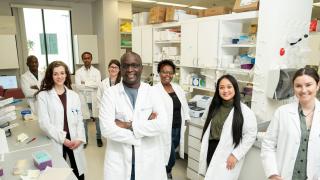
Javier Gordon Ogembo Lab
Our laboratory focuses on oncogenic herpesviruses, in particular, Epstein Barr virus (EBV) and Kaposi-sarcoma associated herpesvirus (KSHV), and on developing prophylactic and therapeutic strategies against primary infection and virus-associated cancers.
EBV is also the main causative agent behind infectious mononucleosis and has been associated with several autoimmune diseases. With no vaccine or virus-specific therapeutic strategies available in the clinic against these viruses and their associated cancers, EBV and KSHV hold a heavy burden on global health.
Thus, our current objective is to develop novel and effective prophylactic and therapeutic strategies — such as vaccines and immunotherapies — against both primary infections with these viruses and subsequent virus-associated cancers. Toward this objective, we also study the basic biology of these viruses, such as understanding entry mechanisms, viral replication, and viral immune evasion strategies, so that we can design and develop more effective treatments.
Research Highlights
Currently, we are working on developing and validating various types of vaccines and immunotherapies against EBV and KSHV and their associated cancers, including:
- EBV prophylactic vaccine. A vaccine to prevent primary EBV infection, currently at the pre-clinical testing phase. Projected Phase I clinical trial in 2022-2023.
- EBV therapeutic vaccine against EBV+ cancers. A vaccine to stimulate T-cell immunity against EBV+ cancers, currently at the pre-clinical testing phase.
- EBV bi-specific antibody immunotherapy. A bi-specific antibody therapy to prevent EBV-driven lymphoproliferative disorders in solid-organ transplant recipients, currently at the pre-clinical testing phase.
- EBV antibody-drug conjugate. A targeted antibody therapy against EBV+ lymphomas, currently at the design stage.
- EBV-specific CAR T cells. CAR T cell therapies against EBV+ cancers, currently at the design stage.
- KSHV prophylactic vaccine. A vaccine to prevent primary KSHV infection, currently at the pre-clinical testing phase. Projected Phase I clinical trial in 2023-2024.
We are also working on the following projects that inform the design of our prophylactic and therapeutic strategies.
- rhLCV surrogate model for EBV infection. Establishing rhesus macaques infected with the rhesus lymphocryptovirus (rhLCV) as a suitable animal model in which to validate EBV viral entry mechanisms in vivo and homologous EBV vaccines and therapies.
- KSHV serodiagnostic kit. Developing a standardized point-of-care serodiagnostic kit to detect KSHV infection, currently unavailable in the clinic.
- KSHV entry mechanisms. Uncovering the role of various KSHV envelope glycoproteins in viral entry into diverse permissive human cell types.
- KSHV immune evasion strategies. Uncovering the mechanisms behind KSHV immune evasion and the role of various KSHV proteins in viral-host immune interactions.
- KSHV marmoset infection model. Establishing the common marmoset as an animal model in which to test vaccines and treatments against KSHV infection and associated cancers.
- The role of KSHV as a causal agent of osteosarcoma in Africa. KSHV has recently been associated with osteosarcoma in the KSHV-endemic Xinjiang region in China. In a new area of research, we are exploring the potential association of KSHV infection with osteosarcoma in Africa, where KSHV is also endemic.
- Human papilloma virus (HPV) screening. Improving methods for screening at-risk women for HPV infection and cervical cancer in Africa.
An associate professor in the Department of Immuno-Oncology, Dr. Ogembo is interested in global health oncology research, particularly understanding the epidemiology of EBV, KSHV and HPV (human papillomavirus); preventing cancer through early screening of at high-risk populations; and assessing the acceptability, feasibility and optimal delivery strategies of various vaccines.
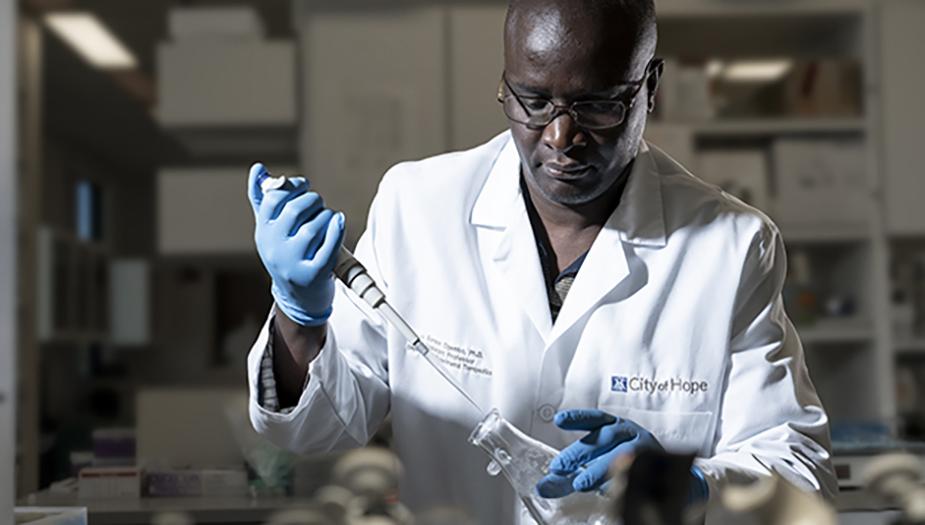
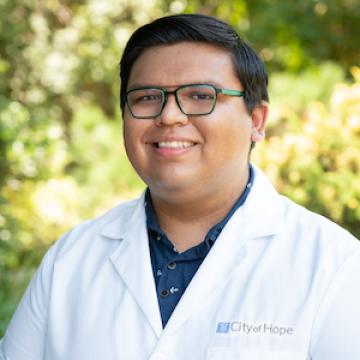

Jonathan Calero-Landa obtained his B.S. in biochemistry in 2020 from the University of California, Riverside, where he had the opportunity to study and develop genetic vector strategies for the control of agricultural pests under the guidance of Dr. Peter Atkinson and Dr. Linda Walling through the NIH-funded MARC-U-STAR fellowship. In 2018, Jonathan had the opportunity of working with Dr. Jorrell Fredericks at the USDA, in Beltsville, MD, to study the seroprevalence of Toxoplasma gondii in market hogs from U.S. slaughterhouses. In 2019, Jonathan worked with Dr. Mark LaBarge at City of Hope as a Eugene and Roberts summer academy student to study aging and its effects on the microenvironment of the mammary gland to determine whether changes to immune cells, such as B and T cells, can influence cancer development. Jonathan is currently a Ph.D. student in the Irell & Manella Graduate School of Biological Sciences at City of Hope working on his doctoral thesis in Dr Ogembo’s laboratory. His thesis project consists of elucidating the roles of Kaposi sarcoma-associated herpesvirus-neutralizing antibodies in preventing viral infection. Jonathan’s hobbies include watching movies of all genres and playing video games in his spare time. His dream is to attend culinary school for fun.
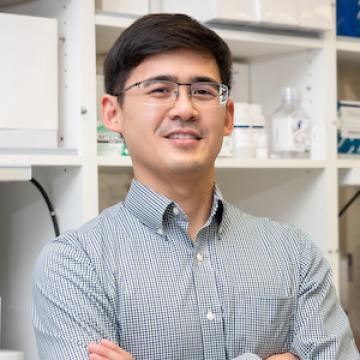

Simeon Cua earned his Ph.D. from Nanyang Technological University in Singapore and recently joined Dr. Ogembo's laboratory as a postdoctoral fellow. His interests include cancer therapeutics and vaccine and drug development. He previously characterized novel monoclonal antibodies as drugs against solid tumors and now plans to work with members of Dr. Ogembo's laboratory to further advance the prophylactic and immunotherapy program against Epstein-Barr virus and Kaposi sarcoma-associated herpesvirus.
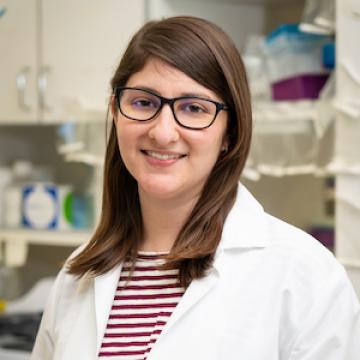

Gabriela Escalante obtained her B.S. in bioengineering-biotechnology in 2017 from the University of California, San Diego, where she had the opportunity to study environmentally-induced autoimmunity under the mentorship of P.I. Dr. Michael Pollard and postdoctoral fellow Dr. Jessica Mayeux. Ms. Escalante is currently a Ph.D. candidate in the Irell & Manella Graduate School of Biological Sciences at City of Hope working on her doctoral thesis in Dr. Ogembo’s laboratory. Her thesis project involves the development and characterization of a multivalent prophylactic vaccine against Epstein-Barr virus and its associated cancers.
Funding: In 2019, Ms. Escalante received an R21 Supplement Grant to support the generation of new Epstein-Barr virus-specific antibodies as reagents to characterize Epstein-Barr virus vaccine candidates. In 2020, Ms. Escalante was awarded a multi-year Department of Defense Horizon Award to fully support her thesis research.
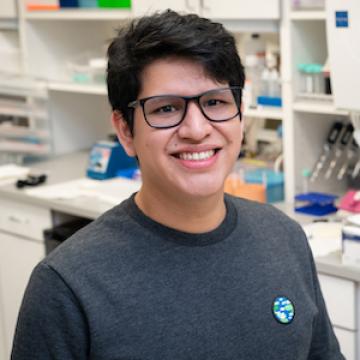

Patrick Gonzalez earned his B.S. in microbiology and parasitology in 2018 from the Universidad Nacional de San Marcos, Peru. As an undergraduate student, Patrick served as an active member of the Ecology and Genomic Virology research group, where he focused on understanding pyrethroid resistance-conferring mutations in Aedes aegypti. He was also part of a six-month internship at University of California, Berkeley under the mentorship of Dr. Randy Schekman, where he focused on studying how RNA-binding proteins are targeted for sorting in the membrane of multivesicular bodies. Patrick is currently a Ph.D. student in the Irell & Manella Graduate School of Biological Sciences at City of Hope and will be working on his doctoral thesis in Dr. Ogembo’s laboratory, which involves the use of rhesus lymphocryptovirus as a model for studying viral entry mechanisms and viral pathogenesis, lymphomageneses and testing novel pre-clinical vaccine candidates to inform future vaccine development against Epstein-Barr virus. Patrick’s hobbies include drawing and writing, his main influences for both hobbies are Z. Beksinski and H.P. Lovecraft.
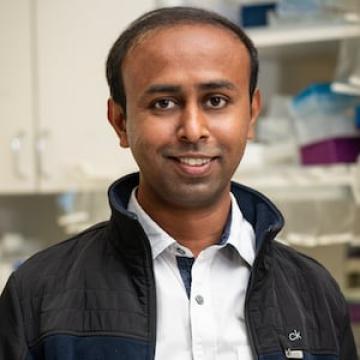

Research Focus
- Understanding the herpesvirus viral and host protein-protein interactions
- Development of prophylactic and therapeutic vaccines for oncogenic herpesvirus-associated cancers
Contact
Email: mmuniraju@coh.org
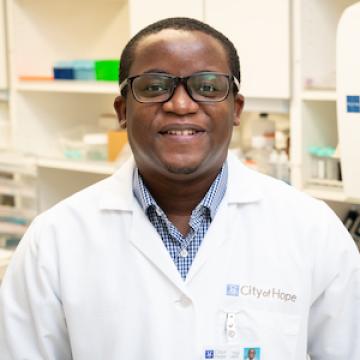

Webster Musonda received his medical degree and orthopedic and trauma specialty training from the University of Zambia School of Medicine and joined the surgical workforce at the University Teaching Hospital in Lusaka, Zambia in 2021. He is a licensed Orthopedic and Trauma surgeon and serves as a senior registrar. Dr. Musonda also has a training background in public health at the master’s level and holds a master’s degree in surgical sciences from the University of Edinburgh, United Kingdom. He is a member of the College of Surgeons of East, Central and Southern Africa and an associate fellow of the American College of Surgeons. He joined Dr. Ogembo’s laboratory at City of Hope National Medical Center as a postdoctoral fellow in 2022 to explore the association between Kaposi sarcoma-associated herpesvirus and the human bone cancer osteosarcoma. His area of interest is global oncology with a future goal of establishing robust infrastructure in cancer research, prevention, diagnosis and treatment in Zambia. Dr. Musonda’s hobbies include traveling, nature watch, gardening and cooking. His dream is to learn how to sing and play various musical instruments.
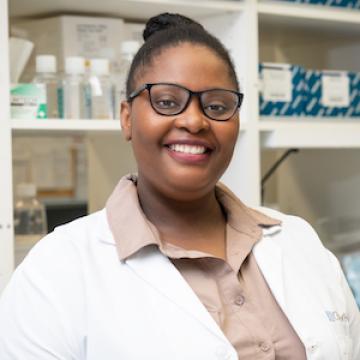

Research Focus
- Development of EBV prophylactic and therapeutic vaccines
- Characterization of EBV antibodies
- Viral and host protein-protein interactions
Contact
Email: lmutsvunguma@coh.org
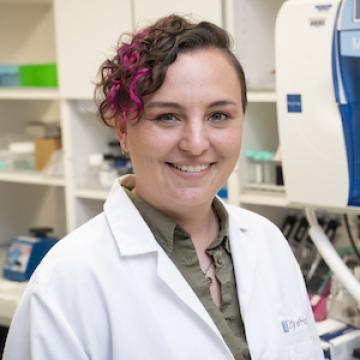

Dr. Reidel earned her Ph.D. from the Universidad Nacional del Litoral, Argentina and Université de Poitiers, France. She is a trained biotechnologist and immunologist specializing in vaccine design, vaccine formulations and immunological characterization of vaccine candidates in various animal models. She has extensive experience in the formulation of adjuvants to prime humoral and cellular immune responses, as well as molecular and serological diagnostics. Dr. Reidel joined Dr. Ogembo’s laboratory in 2022 to design, develop and characterize multivalent prophylactic vaccines against Epstein-Barr virus with an eye on a Phase I clinical trial. She will also develop new serological diagnostics tools for detecting KSHV infection in asymptomatic individuals. Dr. Reidel’s hobbies are singing and taking photographs. Her dream is to travel around the world.
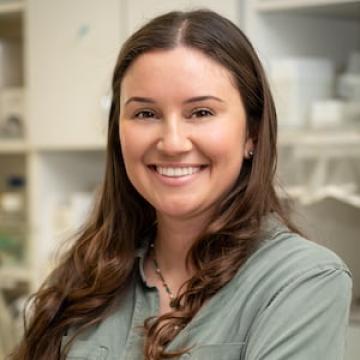

Esther Rodriguez received her B.S. in molecular biology and physiology with a minor in chemistry from California State University, Long Beach. Her lab work began as a Eugene and Ruth Roberts summer student in the Ogembo lab cloning and characterizing four glycoproteins essential for Kaposi Sarcoma Herpesvirus Virus (KSHV) entry. Now a research associate in the lab, her work is focused on developing a point-of-care diagnostic tool kit that can detect KSHV infection in the blood of individuals. Esther is working toward the ultimate goal of pursuing a Ph.D. in biological sciences.
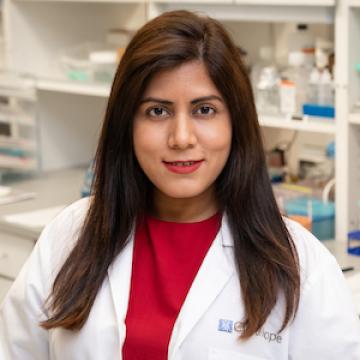

Preeti Sharma earned her Ph.D. from the University of Florence, Italy as a Marie Curie Fellow. During her doctoral program, she established a cellular model of human skeletal myogenesis and characterized the role of calcium-sensing receptors and parathyroid hormones in human skeletal muscle. Dr. Sharma began working at City of Hope at the end of 2021 with the goal of pursuing a career in virology and vaccine development in Dr. Ogembo's laboratory. Her research is focused on elucidating the mechanism of rhesus macaque lymphocryptovirus entry into various cell types as a strategy to understand how Epstein-Barr virus initially penetrates the oral mucosa to initiate the acute primary infection, which remains poorly understood and a key impediment to the development of an effective vaccine. Dr. Sharma’s hobbies are dancing, meditation and fitness. Her long-term goal is to lead a worldwide pharmaceutical company in the development of noble therapeutic strategies to enhance global health.
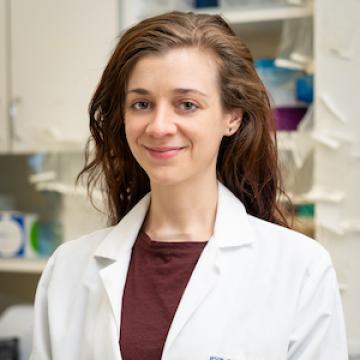

Cloe Zimmerman graduated from University of Washington in Seattle with a B.A. in psychology in 2007. She earned a graduate certificate in biotechnology from California State University, Los Angeles in 2016, including a six-month internship at Gilead Pharmaceutical Sciences. She next worked as a grant project assistant for LA BioStart at Cal State LA and also worked in the Howard Xu lab at the university, researching virulence factors in multidrug-resistant strains of Acinetobacter baumannii.
Zimmerman is currently a student in the Master of Science in Translational Medicine program, run jointly by the Irell & Manella Graduate School of Biological Sciences at City of Hope and Keck Graduate Institute. Zimmerman intends to transition to a Ph.D. in Translational Medicine at City of Hope's graduate school in Spring 2021. Her master’s thesis in the laboratory of Javier Gordon Ogembo, Ph.D., concerns the generation and characterization of a prophylactic vaccine for the Epstein-Barr virus.
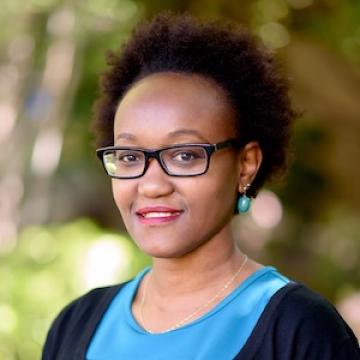

Dr. Barasa obtained her medical training (M.B.ChB) and specialization in Human Pathology (M.Med Human Pathology) from the University of Nairobi, Kenya. She currently serves as a lecturer and the thematic head of immunology at the University of Nairobi, Department of human pathology, and as consultant pathologist at the Kenyatta National Teaching and Referral Hospital, Nairobi, Kenya. Dr. Barasa's research is focused on understanding the pathology of cancers caused by Epstein-Barr virus and Kaposi sarcoma-associated herpesvirus. Dr. Barasa was the first to develop and test the immunogenicity of KSHV-based vaccines as a potential strategy to prevent virus infection and its associated cancers. In 2015, she joined Dr. Ogembo’s laboratory at the University of Massachusetts Medical School and later relocated with him to Beckman Research Institute of City of Hope as a Union for International Cancer Control (UICC) and American Cancer Society Research Fellow.
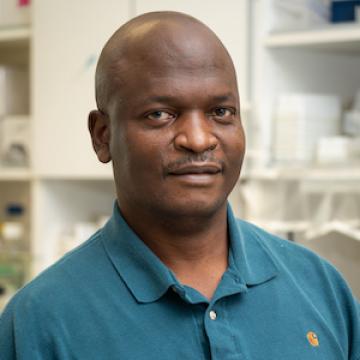

Dr. Mulama holds a Ph.D. in immunology from Maseno University, Kenya with a research component carried out in conjunction with the University of Massachusetts Medical School. He earned his master of science degree in immunology from Kenyatta University, Nairobi, Kenya, which was also a sandwich program with Cardiff University, Wales, United Kingdom. During his postgraduate studies, David studied the interaction between Epstein-Barr virus and Plasmodium falciparum, the two ubiquitous infectious agents in the tropics that chronically interact to lead to the emergence of endemic Burkitt lymphoma. During this time, Dr. Mulama showed that chronic P. falciparum exposure was associated with diminished Epstein-Barr virus-specific T cell response in children living in malaria-holoendemic regions.
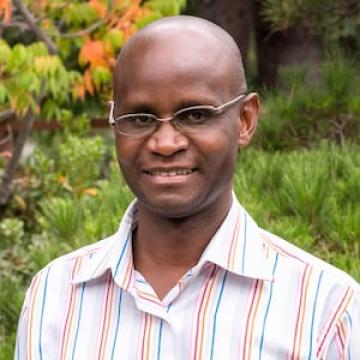

Dr. Nyagol obtained his Ph.D. in quantitative and molecular diagnostic pathology from the University of Siena, Italy. Currently, he is a senior lecturer and biomedical research scientist in the thematic unit of immunology, Department of Human Pathology at the University of Nairobi, Kenya. Between 2016-2017, he performed postdoctoral research training in Dr. Ogembo’s laboratory. His current research interests include immuno-molecular etiopathogenesis of Epstein-Barr virus and Kaposi sarcoma-associated herpesvirus-associated cancers, as well as investigating the role of the Epstein-Barr virus in the development of undifferentiated nasopharyngeal carcinomas.
Previous Students
- 2016, Yash Pal Shah (Eugene and Ruth Roberts Summer Academy)
- 2016, Benjamin Nittayo (Eugene and Ruth Roberts Summer Academy)
- 2016, Daniel Saeang (Eugene and Ruth Roberts Summer Academy)
- 2017, Riley Richmond (Eugene and Ruth Roberts Summer Academy)
- 2017, Esther Rodriguez (Eugene and Ruth Roberts Summer Academy)
- 2017, Kierra Valdez-McClure (Eugene and Ruth Roberts Summer Academy)
- 2018, Pablo Martinez (Eugene and Ruth Roberts Summer Academy)
- 2018, Pauline Kirabo (Eugene and Ruth Roberts Summer Academy)
- 2018, Marion Santo (Eugene and Ruth Roberts Summer Academy)
- 2018, Gabriela Escalante (Irell and Manella Graduate School of Biological Sciences; graduate rotation)
- 2018, Hernan Reza (Irell and Manella Graduate School of Biological Sciences; graduate rotation)
- 2019, Claire Harelson (Eugene and Ruth Roberts Summer Academy)
- 2019, Amy Zhou (Eugene and Ruth Roberts Summer Academy)
- 2019, Victoria Erickson (Eugene and Ruth Roberts Summer Academy)
- 2019, Juliet Gonzales (Irell and Manella Graduate School of Biological Sciences; graduate rotation)
- 2020, Metztli Cisneros (Irell and Manella Graduate School of Biological Sciences; graduate rotation)
- 2020, Cloe Zimmerman (KGI–City of Hope Master of Science in Translational Medicine)
- 2020, Ku'ulei Faustino (KGI–City of Hope Master of Science in Translational Medicine)
- 2020, Ijeoma Nnadozie (KGI Master of Science in Applied Life Sciences; graduate rotation)
- 2020, Jonathan Calero-Landa (Irell and Manella Graduate School of Biological Sciences; graduate rotation)
These organizations are invaluable partners in our work toward progressing the development of new treatments in our specialized areas of research.

Latest Research News
No articles found matching the selected criteria.
34.1293409, -117.971358
Duarte, CA 91010